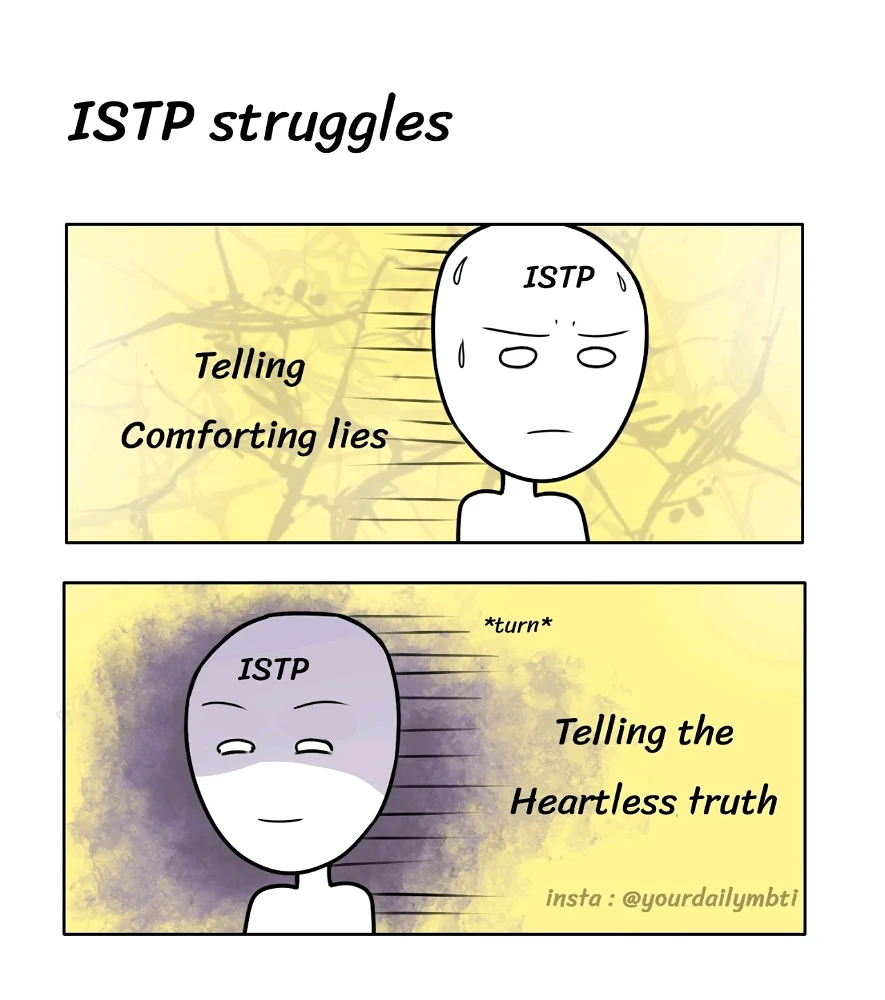We use cookies on our website for a number of purposes, including analytics, performance, and advertising. Learn more.
OK!
Boo
SIGN IN
ISTP Stereotypes: Distant and Unable to Commit
By Derek Lee
Caught you, didn't we? A little curiosity about us ISTPs, eh? We don't bite. Not much, anyway. Here's where we crack open those ISTP stereotypes you've heard about us being distant or commitment-phobic. Prepare for a deep-dive into our minds, our values, and our behaviors, because understanding is the key to harmonious interactions with us. And who knows? You might even have a laugh or two along the way.
The Distant Wanderer: More Than Meets the Eye
Here's a scene: You catch an ISTP in their natural habitat. Eyes glazed over, lost in thought, we appear distant, like the lone wolf. A fair assumption, given our penchant for solitude, but it's a little more complex than that.
Our brain operates using Introverted Thinking (Ti) and Extroverted Sensing (Se), primarily. Ti loves analysis and deep thoughts, while Se pushes us to experience the world first-hand. When we zone out, we're not just being distant. We're busy processing, analyzing, and interpreting the world around us. This knack for observation and analysis is our secret weapon, making us excellent problem solvers and strategists.
As ISTPs, we value time alone to recharge, reflecting on our experiences and gathering our thoughts. In social situations, we might seem like we're on another planet, but really, we're just appreciating the party in our own way - observing, thinking, taking it all in. So if you're dating an ISTP or working with one, don't mistake our need for solitude as a rejection. We'll come back, armed with a sharp observation or a witty remark. We ISTPs are like cats - we wander off, but we always know our way home.
Commitment-Phobe? More Like Selective Loyalist
Ah, the classic ISTP stereotype of commitment issues. We'll admit, it's not entirely baseless. We value our freedom and fear being tied down. But let's dive a bit deeper into that ISTP stereotype vs reality.
Our Se function encourages us to explore, take risks, and push boundaries. This leads to a reluctance to settle down, seen as fear of commitment. But here's the secret - when we ISTPs find something (or someone) worth committing to, we are all in. This all-or-nothing approach stems from our cognitive function - Introverted Intuition (Ni). Ni gives us a knack for long-term planning, and once we've decided that something fits into our plans, we are relentless.
In relationships or careers, we aren't quick to commit. But when we do, we are fiercely loyal and determined to make it work. If you're the lucky one we ISTPs choose, know that we're in it for the long haul. We don't give up on people who matter to us, and we'll always be there to back you up, bring you a beer, or help you solve a problem. We're not scared of commitment - we're selective about who we share our lives with.
In Conclusion: The Practical Pragmatist Behind ISTP Stereotypes and Misunderstandings
There you have it - the stereotypical ISTP traits of being distant and commitment-phobic, deconstructed. What might seem standoffish is really a blend of our cognitive functions and inherent personality. We're not distant - we're observers. We're not commitment-phobic - we're selective loyalists.
As ISTPs, we understand that these ISTP personality stereotypes can lead to misunderstandings. But, remember this: under our tough, aloof exterior, we are practical pragmatists, fiercely loyal to those who earn our trust, and, dare we say, pretty fun to be around. Now that you've peeked behind the curtain, we hope you'll appreciate us for who we truly are. After all, it's always more fun when you're in on the joke.
MEET NEW PEOPLE
JOIN NOW
20,000,000+ DOWNLOADS
ISTP People and Characters
Universes
Personalities
Personality Database
Meet New People
20,000,000+ DOWNLOADS
JOIN NOW


















































